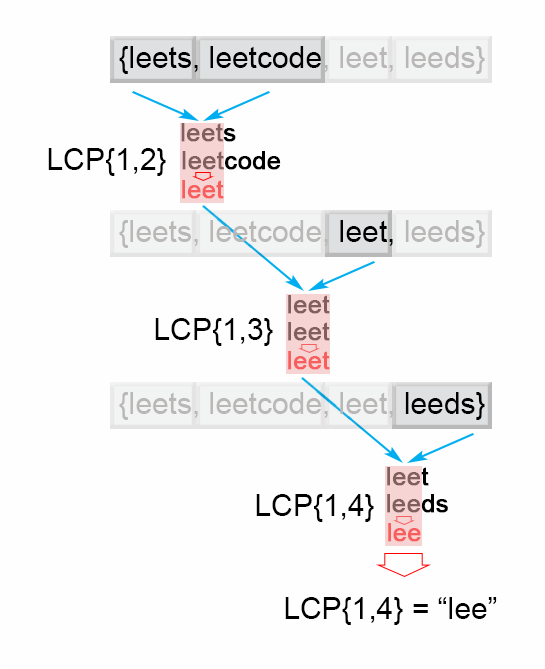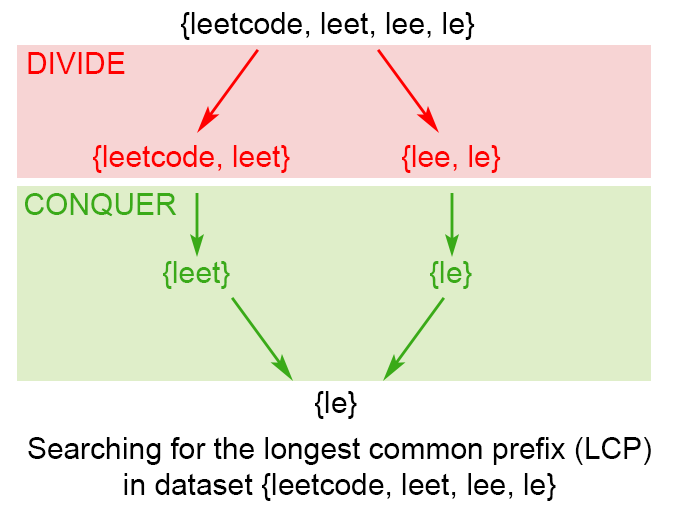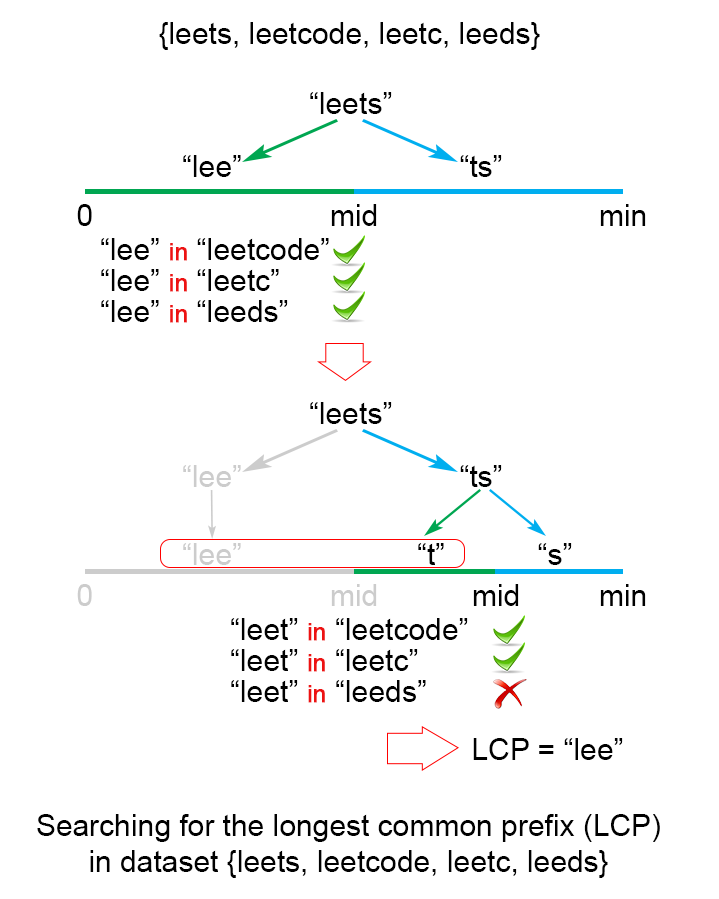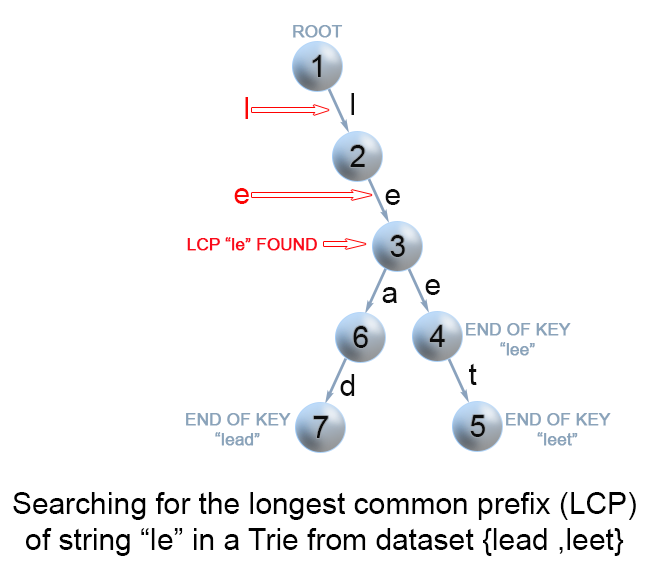leetcode刷题记录:Longest Common Prefix
来源:互联网 发布:淘宝虚假广告怎么投诉 编辑:程序博客网 时间:2024/06/02 06:57
Question
Write a function to find the longest common prefix string amongst an array of strings.
Solution
Approach #1 (Horizontal scanning)
Question
Write a function to find the longest common prefix string amongst an array of strings.
Intuition
For a start we will describe a simple way of finding the longest prefix shared by a set of strings LCP(S1…Sn). We will use the observation that :
LCP(S1…Sn)=LCP(LCP(LCP(S1,S2),S3),…Sn)
Algorithm
To employ this idea, the algorithm iterates through the strings [S1…Sn], finding at each iteration i the longest common prefix of strings LCP(S1…Si)When LCP(S1…Si) is an empty string, the algorithm ends. Otherwise after n iterations, the algorithm returns LCP(S1…Sn).

Figure 1. Finding the longest common prefix (Horizontal scanning)
Java
public String longestCommonPrefix(String[] strs) { if (strs.length == 0) return ""; String prefix = strs[0]; for (int i = 1; i < strs.length; i++) while (strs[i].indexOf(prefix) != 0) { prefix = prefix.substring(0, prefix.length() - 1); if (prefix.isEmpty()) return ""; } return prefix;}
Complexity Analysis
- Time complexity : O(S) , where S is the sum of all characters in all strings.
In the worst case all n strings are the same. The algorithm compares the string S1 with the other strings [S2…Sn] There are S character comparisons, where S is the sum of all characters in the input array.
- Space complexity : O(1). We only used constant extra space.
Approach #2 (Vertical scanning)
Algorithm
Imagine a very short string is at the end of the array. The above approach will still do S comparisons. One way to optimize this case is to do vertical scanning. We compare characters from top to bottom on the same column (same character index of the strings) before moving on to the next column.
Java
public String longestCommonPrefix(String[] strs) { if (strs == null || strs.length == 0) return ""; for (int i = 0; i < strs[0].length() ; i++){ char c = strs[0].charAt(i); for (int j = 1; j < strs.length; j ++) { if (i == strs[j].length() || strs[j].charAt(i) != c) return strs[0].substring(0, i); } } return strs[0];}
Complexity Analysis
- Time complexity : O(S) , where S is the sum of all characters in all strings. In the worst case there will be n equal strings with length m and the algorithm performs S=m∗n character comparisons. Even though the worst case is still the same as Approach #1, in the best case there are at most n∗minLen comparisons where minLen is the length of the shortest string in the array.
- Space complexity : O(1). We only used constant extra space.
Approach #3 (Divide and conquer)
Intuition
The idea of the algorithm comes from the associative property of LCP operation. We notice that : LCP(S1…Sn)=LCP(LCP(S1…Sk),LCP(Sk+1…Sn)) , where LCP(S1…Sn) is the longest common prefix in set of strings [S1…Sn] , 1<k<n
Algorithm
To apply the observation above, we use divide and conquer technique, where we split the LCP(Si…Sj) problem into two subproblems LCP(Si…Smid)and LCP(Smid+1…Sj), where mid is 2i+j. We use their solutions lcpLeft and lcpRight to construct the solution of the main problem LCP(Si…Sj). To accomplish this we compare one by one the characters of lcpLeft and lcpRight till there is no character match. The found common prefix of lcpLeft and lcpRight is the solution of the LCP(Si…Sj).

Figure 2. Finding the longest common prefix of strings using divide and conquer technique
Java
public String longestCommonPrefix(String[] strs) { if (strs == null || strs.length == 0) return ""; return longestCommonPrefix(strs, 0 , strs.length - 1);}private String longestCommonPrefix(String[] strs, int l, int r) { if (l == r) { return strs[l]; } else { int mid = (l + r)/2; String lcpLeft = longestCommonPrefix(strs, l , mid); String lcpRight = longestCommonPrefix(strs, mid + 1,r); return commonPrefix(lcpLeft, lcpRight); }}String commonPrefix(String left,String right) { int min = Math.min(left.length(), right.length()); for (int i = 0; i < min; i++) { if ( left.charAt(i) != right.charAt(i) ) return left.substring(0, i); } return left.substring(0, min);}
Complexity Analysis
In the worst case we have n equal strings with length m
Time complexity : O(S), where S is the number of all characters in the array, S=m∗n Time complexity is T(n)=2T(2n)+O(m). Therefore time complexity is O(S). In the best case this algorithm performs O(minLen∗n) comparisons, where minLen is the shortest string of the array
Space complexity : O(m∗log(n))
There is a memory overhead since we store recursive calls in the execution stack. There are log(n) recursive calls, each store need m space to store the result, so space complexity is O(m∗log(n))
Approach #4 (Binary search)
The idea is to apply binary search method to find the string with maximum value L, which is common prefix of all of the strings. The algorithm searches space is the interval (0…minLen), where minLen is minimum string length and the maximum possible common prefix. Each time search space is divided in two equal parts, one of them is discarded, because it is sure that it doesn't contain the solution. There are two possible cases: S[1...mid] is not a common string. This means that for each j > i S[1..j] is not a common string and we discard the second half of the search space. S[1...mid] is common string. This means that for for each i < j S[1..i] is a common string and we discard the first half of the search space, because we try to find longer common prefix.

Figure 3. Finding the longest common prefix of strings using binary search technique
Java
public String longestCommonPrefix(String[] strs) { if (strs == null || strs.length == 0) return ""; int minLen = Integer.MAX_VALUE; for (String str : strs) minLen = Math.min(minLen, str.length()); int low = 1; int high = minLen; while (low <= high) { int middle = (low + high) / 2; if (isCommonPrefix(strs, middle)) low = middle + 1; else high = middle - 1; } return strs[0].substring(0, (low + high) / 2);}private boolean isCommonPrefix(String[] strs, int len){ String str1 = strs[0].substring(0,len); for (int i = 1; i < strs.length; i++) if (!strs[i].startsWith(str1)) return false; return true;}
Complexity Analysis
In the worst case we have n equal strings with length m
- Time complexity : O(S∗log(n)), where S is the sum of all characters in all strings.
The algorithm makes log(n) iterations, for each of them there are S=m∗n comparisons, which gives in total O(S∗log(n)) time complexity.
- Space complexity : O(1).
We only used constant extra space.
Further Thoughts / Follow up
Let's take a look at a slightly different problem:
Given a set of keys S = [S1,S2…Sn], find the longest common prefix among a string
qand S. This LCP query will be called frequently.
We could optimize LCP queries by storing the set of keys S in a Trie. For more information about Trie, please see this article Implement a trie (Prefix trie). In a Trie, each node descending from the root represents a common prefix of some keys. But we need to find the longest common prefix of a string q and all key strings. This means that we have to find the deepest path from the root, which satisfies the following conditions: it is prefix of query string q each node along the path must contain only one child element. Otherwise the found path will not be a common prefix among all strings. * the path doesn't comprise of nodes which are marked as end of key. Otherwise the path couldn't be a prefix a of key which is shorter than itself.
Algorithm
The only question left, is how to find the deepest path in the Trie, that fulfills the requirements above. The most effective way is to build a trie from [S1…Sn]strings. Then find the prefix of query string q in the Trie. We traverse the Trie from the root, till it is impossible to continue the path in the Trie because one of the conditions above is not satisfied.

Figure 4. Finding the longest common prefix of strings using Trie
Java
public String longestCommonPrefix(String q, String[] strs) { if (strs == null || strs.length == 0) return ""; if (strs.length == 1) return strs[0]; Trie trie = new Trie(); for (int i = 1; i < strs.length ; i++) { trie.insert(strs[i]); } return trie.searchLongestPrefix(q);}class TrieNode { // R links to node children private TrieNode[] links; private final int R = 26; private boolean isEnd; // number of children non null links private int size; public void put(char ch, TrieNode node) { links[ch -'a'] = node; size++; } public int getLinks() { return size; } //assume methods containsKey, isEnd, get, put are implemented as it is described //in https://leetcode.com/articles/implement-trie-prefix-tree/)}public class Trie { private TrieNode root; public Trie() { root = new TrieNode(); }//assume methods insert, search, searchPrefix are implemented as it is described//in https://leetcode.com/articles/implement-trie-prefix-tree/) private String searchLongestPrefix(String word) { TrieNode node = root; StringBuilder prefix = new StringBuilder(); for (int i = 0; i < word.length(); i++) { char curLetter = word.charAt(i); if (node.containsKey(curLetter) && (node.getLinks() == 1) && (!node.isEnd())) { prefix.append(curLetter); node = node.get(curLetter); } else return prefix.toString(); } return prefix.toString(); }}
Complexity Analysis In the worst case query q has length m and it is equal to all n strings of the array.
- Time complexity : preprocessing O(S), where S is the number of all characters in the array, LCP query O(m)
Trie build has O(S) time complexity. To find the common prefix of q in the Trie takes in the worst case O(m).
- Space complexity : O(S)
We only used additional S extra space for the Trie.
Analysis written by: @elmirap.
- leetcode刷题记录:Longest Common Prefix
- Leetcode刷题记——14. Longest Common Prefix(最长公共前缀)
- LeetCode: Longest Common Prefix
- LeetCode Longest Common Prefix
- LeetCode : Longest Common Prefix
- [Leetcode] Longest Common Prefix
- [LeetCode] Longest Common Prefix
- [LeetCode]Longest Common Prefix
- LeetCode-Longest Common Prefix
- [LeetCode] Longest Common Prefix
- LeetCode - Longest Common Prefix
- leetcode Longest Common Prefix
- LeetCode | Longest Common Prefix
- Leetcode: Longest Common Prefix
- LeetCode: Longest Common Prefix
- 【LeetCode】Longest Common Prefix
- [LeetCode] Longest Common Prefix
- [LeetCode]Longest Common Prefix
- 解读Cardinality Estimation算法(第一部分:基本概念)
- Emmet 学习笔记
- nodejs+express+mysql 增删改查
- 前端性能优化(DOM操作篇)
- 记录一下我的Android项目里的基类的的基本设计
- leetcode刷题记录:Longest Common Prefix
- 排列组合算法总结(含Java实现)
- 字符流中第一个不重复的字符(java版)
- 排列组合算法总结(含Java实现)
- js中的prototype的解析
- 微信小程序位置API
- Library auk_dspip_lib not found问题解决
- 基于canvas的图像大小处理
- python当中subprocess里call与Popen的用法区别


